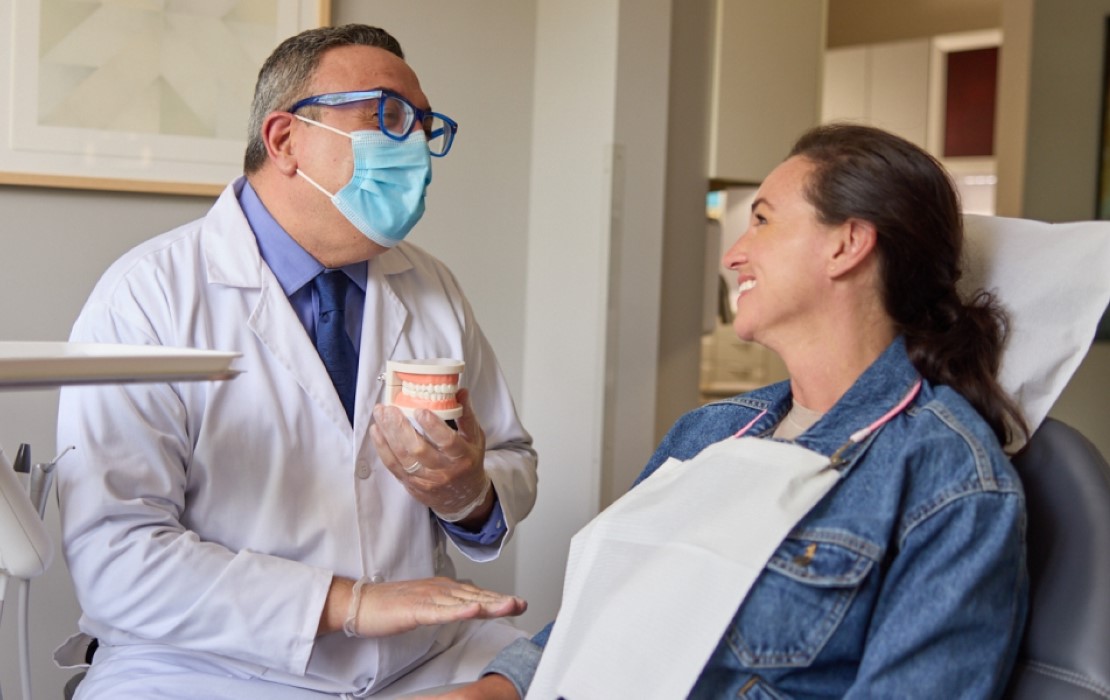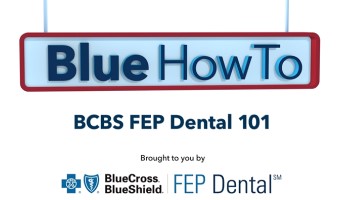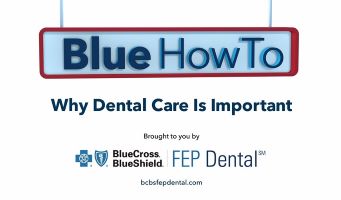Visual:
On screen text, Blue How To. Why Dental Care Is Important. Brought to you by Blue Cross Blue Shield FEP Dental. bcbsfepdental.com.
Visual:
On screen text, Pay attention to your mouth.
Announcer:
A nice smile is one of the first things people notice about you. But having nice-looking teeth doesn't necessarily mean you have good oral health.
Visual:
Animation of a middle-aged man. He waves and smiles.
Visual:
Animation of a tooth, with most of it below the gum line. The tooth spins to reveal its dentin, pulp, nerves and blood vessels.
Announcer:
About two thirds of each tooth is underneath your gums. That's why it's important to keep your whole mouth healthy, not just the teeth you can see.
Visual:
Animation of a sign connected to cables drops down into view. On the sign, text. Your Mouth and Your Health.
Visual:
The Middle-aged man brushes his teeth at a sink. Beside him, a small cup and a tube of toothpaste.
Announcer:
Did you know that tooth decay is one of the most common diseases in the world? But good oral health is about more than just protecting your teeth-Your mouth and overall health are
connected. A sore jaw along with chest pain can be a sign of a heart attack.
Visual:
Animation of a heart inside a circle. A cardiogram line runs through the heart. Another circle spins in to reveal a graphic of a pregnant person. Finally, a third circle spins in revealing two green splodges with yellow centers.
Announcer:
Pregnant individuals with poor oral hygiene are also seven times more likely to give birth to premature and low-birth-weight babies. Bacteria in your mouth can even spread to other parts of the body and cost secondary infections.
Visual:
Animation of a sign connected to cables drops down into view. On the sign, text. Dental Care at Home.
Visual:
Animation of the middle-aged man cleaning his teeth. Standing with him, also cleaning her teeth, his daughter.
Announcer:
Regular brushing, flossing, and checkups with your dentist are all effective ways to maintain good oral health. You should brush for at
least two minutes twice a day and as often as after every meal.
Visual:
Animation of the Daughter brushing her teeth by the sink. Beside her, an image of an hourglass with text, 2 minutes
appears. Then, her cell phone buzzers and she picks it up.
Announcer:
Brushing removes plaque, a layer of bacteria that clings to your teeth. Try setting a timer for two minutes or using the Blue Cross Blue Shield
FEP Dental app's timer tool to help you make sure you brush long enough.
Visual:
Animation of a calendar spinning. It's pages flip open and a toothbrush appears beside the calendar.
Announcer:
And remember, replace your toothbrush every three to four months so it can effectively clean your teeth.
Floss once a day. Flossing removes plaque and food between your teeth, where your toothbrush can't reach.
Visual:
Animation of the Dad flossing.
Announcer:
Improper or insufficient brushing and flossing can lead to plaque becoming tarter. Once formed, tarter can only be removed by a
dentist or dental hygienist.
Visual:
Animation of the Daughter as she joins Dad at the sink. She sips from a small cup. Dad sips from a large cup.
Announcer:
Use antibacterial mouthwash daily, either before or after brushing. This type of mouthwash is able to kill bacteria responsible for plaque, gum
disease, and bad breath in areas not easily brushed by a toothbrush.
Visual:
Animation of a sign connected to cables drops down into view. On the sign, text. Dental Exams.
Announcer:
At-home care alone isn't enough. Routine visits to the dentist help ensure your mouth stays in good health.
Visual:
Animation of a dental surgery. A Dentist wears a surgical mask as she stands over her
patient. The patient opens her mouth. The Dentist swipes a large screen and an X ray of the patient's teeth appears.
Announcer:
During a dental exam, a dentist will clean your teeth and check for any signs of cavities, gum disease, or other conditions in your mouth and
neck area. The exam may also include X-rays to allow the dentist to thoroughly evaluate and diagnose oral diseases and conditions that
cannot otherwise be seen.
Visual:
Animation of the Dad and Daughter smiling. She wears dental braces. Below them, two calendars flip up their pages.
Announcer:
Everyone's oral-health needs are different. The American Dental Association recommends you talk to your dentist and determine how
often you should get dental exams.
Visual:
Animation of a sign connected to cables drops down into view. On the sign, text. Why Get Dental Insurance?
Visual:
Animation of an medical insurance paper with two stethoscopes in the top left. A red X appears next to it.
Announcer:
Medical insurance doesn't cover many important dental costs. Even if you don't currently require any dental services, like crowns and root
canals, you're still at risk. Dental insurance covers these common services and procedures, plus a lot more, meaning you not only pay
less or nothing at all for those services, but you might also avoid the costs of treating dental complications down the line.
Visual:
Animation of a dental insurance document with a tooth in the top left corner. A green check appears next to it. To the right, on screen
text appears. Teeth Cleanings. Root canals. Filings. Crowns.
Visual:
Animation of a sign connected to cables drops down into view. On the sign, text. BCBS FEP Dental.
Visual:
Animation of the Dad and his Daughter, smiling. Dad holds up a card. Next to them, on screen text. Proudly supporting our Uniformed
Service Retirees and the Families with quality dental coverage.
Announcer:
Blue Cross Blue Shield FEP Dental offers comprehensive dental coverage for federal employees, retired federal employees,
retired uniformed service members, and their families.
Visual:
Animation of a sign connected to cables drops down into view. On the sign, text. Benefits from Day One.
Announcer:
When you enrol, you get benefits that give you peace of mind.
Visual: Animation of 4 circles across two rows. In the first row, the first circle has a green tick. Below it, text. Fully-covered, in-network preventive care.
The second circle in the first row has a dollar sign. Below, text. No in-network deductibles.
The first circle in the second row has a tooth. Below it, text. Three free cleanings a year.
The second circle has an interconnected grid of 3 people. Below it, text. Large nationwide network.
Announcer: Like fully covered in-network preventive care, including up to three dental
cleanings a year, no deductible for in-network services, like fillings and root canals, and a large nationwide network with over
half-a-million in-network dentists and their locations.
Animation of Dad placing an arm around his Daughters shoulders. They both smile.
Announcer:
Also, orthodontic services, including traditional braces and clear aligners, are covered for children and adults. Not to mention Class B
and C services are all covered at 100% for children age 13 and under when visiting an in-network dentist. Plus, there's no waiting period,
meaning you can use your orthodontic benefits on day one of your coverage being active.
Visual:
Animation of the Dad, at the dental surgery, sat in a treatment chair. He talks to the Dentist, who wears a surgical mask. She then holds up
a tablet with information on it.
Announcer:
BCBS FEP Dental is proud to support the oral needs of all its members. If you have a serious condition, such as diabetes, heart
disease, end stage renal disease, head-and-neck cancer, a suppressed immune system, or are pregnant, we cover dental services that are important
for maintaining your well-being. That includes oral evaluations, periodontal scaling and
root planning, periodontal maintenance, palliative treatments, and a lot more.
Visual:
Animation of a sign connected to cables drops down into view. On the sign, text. Savings that Make You Smile.
Announcer:
Speaking of savings, let's say you got two routine oral exams, one problem-focused oral exam, three cleanings, and one set of X-rays
throughout the year. Without dental coverage, you'd pay about $685 on average.
Visual:
Animation of three circles. In the first, a dentist wears a face mask. A smaller circle next to her has text. x2. The second, dental
implements. A smaller circle next to this has text. x3. The third circle has an X ray of teeth within it. The smaller circle next to
it has text, x1. More on screen text. What you pay without BCBS FEP Dental, $685. A small Asterix stands beside the number. Below, more
on screen text. Another Asterix with the words, Savings are based on 2023 BCBS FEP Dental Estimates. Assumes you visit in-network dentists.
Below the other images more text appears. $0.
Announcer:
With BCBS FEP Dental, you'd pay nothing. Let's look at another example. Say you needed a root canal and crown.
Visual:
Animation of two circles spinning in. In one, a tooth with a red end. In the other, half a tooth with the crown about to be fitted on top.
Animation now changes to 2 rows, with the two circles in the first row. In the second row, there are three boxes.
In the first box, text. What you pay with Standard Option. Below the box, text. $1145.
In the second box, text. What you pay with High Option. Below the box, text. $885.
In the third box, text. What you pay without BCBS FEP Dental. Below the box, text. $ 3110 with a footnote. Savings are based on 2023 BCBS FEP Dental estimates. Assumes you visit in-network dentists.
Announcer:
On average, you'd pay $3,110 without dental coverage. With High Option, you'd pay just $885, and $1,145 with Standard Option.
Visual:
Animation of Dad and Daughter smiling. He has his arm over he shoulder.
Announcer:
Having a smile you love is priceless and so are the savings you get with BCBS FEP Dental. Visit bcbsfepdental.com/benefits to learn more
about all the ways we can help you smile with confidence.
Visual:
On screen text. Blue How To. Why Dental Care is Important. Brought to you by Blue Cross Blue Shield, FEP Dental.
For additional information or questions, contact us at 1-855-504-BLUE
(2583) (TTY:711) or visit us online at bcbsfepdental.com.
Visual:
The Apple Store and Google Play logos.
Audio Description by VITAC.










